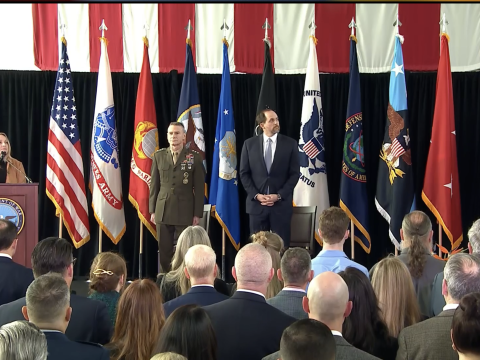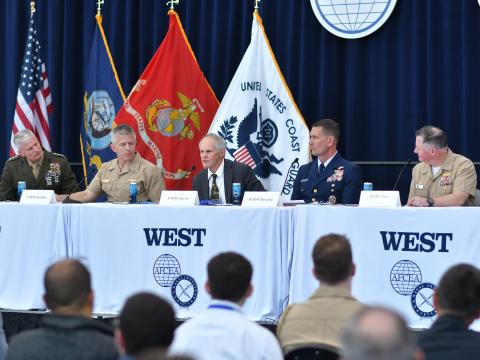Global Instability, from Europe to the Korean Peninsula
The global security environment is becoming increasingly unstable, with conflicts intensifying in the Middle East and Europe. These are not isolated but interconnected through a network of transactional relationships among adversaries, where resources, technology and human capital are exchanged to fuel disorder, Adm. Samuel Paparo, commander of U.S. Indo-Pacific Command said.
As the military leader called out North Korea for contributing troops for Russia’s invasion of Ukraine, he wondered what capabilities the Asian country was receiving in exchange.
“I see the risk of what kind of technology is going into North Korea in their proliferation efforts,” Adm. Paparo said.
He went on to describe North Korea’s ballistic missile testing and nuclear ambitions, Russia’s invasion of Ukraine, and Iran’s supply of drones and missiles to Russia as part of a global web of disruption.
Adm. Paparo offered a keynote address at TechNet Indo-Pacific, a yearly event held in Honolulu, on Thursday.
The People’s Republic of China (PRC) is engaged in the largest military buildup since World War II, according to Adm. Paparo.
This poses a challenge to U.S. interests in the Indo-Pacific. Its coercive actions toward Taiwan and expansionist claims in the South China Sea could ignite the next global flashpoint.
“The PRC's coercive campaign against Taiwan continues, looking to change the status quo with coercion and with the threats of force and with the PRCs revanchist,” Adm. Paparo told the audience.
The alliances and partnerships the U.S. has cultivated are critical, but they are not enough; hard work, resources and real combat capability are required to maintain deterrence and readiness, explained Adm. Paparo.
Technology plays a pivotal role in this environment, especially advancements in computing, artificial intelligence, hypersonics and nanotechnology. The race is on to match these developments with combat power, as success hinges on the ability to see, understand, communicate and act faster than adversaries.
Speaking to industry leaders in the room, he said, “We need your innovation, we need your drive to continue to improve on our interoperability. We can't do it without you. You are indispensable to the effort, your experience, your knowledge, your energy, your effort, the defense industrial base is key, critical and indispensable to the effort.”
He went further and explained that the U.S. must modernize its command and control systems across the Indo-Pacific, integrating cloud-enabled warfighting capabilities and secure communication networks to strengthen joint and allied operations.
Amid this, the focus remains on deterrence, but the need for readiness in every moment is emphasized. Adversaries’ growing military capabilities, particularly China’s, demand vigilance and a force capable of prevailing in conflict, should deterrence fail, Adm. Paparo said.
TechNet Indo-Pacific is organized by AFCEA International and the AFCEA Hawaii Chapter. SIGNAL Media is the official media of AFCEA International.



Comments